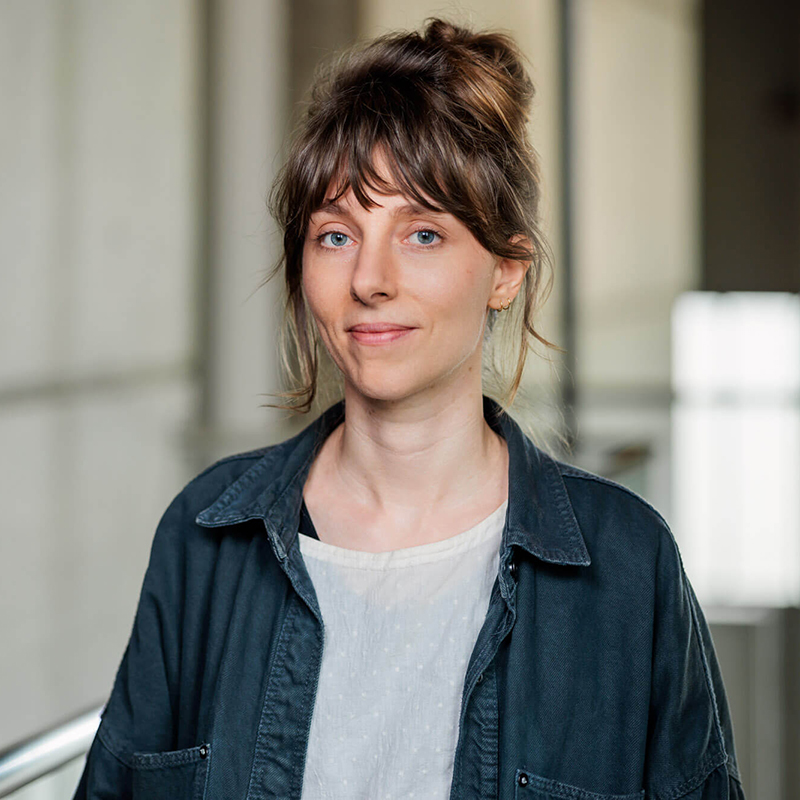Réka Bucsi
Réka Bucsi received her master's degree in animated film from the Moholy-Nagy University of Art and Design in Budapest. Her graduation film “Symphony no. 42” was shortlisted for the Oscars in the “Best Animated Short Film” category in 2014. Her films have been presented at numerous international festivals - three works premiered in the Berlinale Shorts competition, others screened at the Sundance Film Festival (2015, 2016), the Annecy Short Film Festival, AFI Fest, the BFI London Film Festival and SXSW (2016, 2018). In 2017, “Love” was also nominated for “Best Short Film” at the European Film Awards. With her film SOLAR WALK, she won the Audi Short Film Award at the Berlinale 2018 and the Grand Prix at the Ottawa International Animation Festival 2018. SOLAR WALK was also nominated for “Best Short Film” at the Annie Award 2019 and was included in the Criterion Channel's selection.
Réka Bucsi has been a member of numerous international film festival juries. She is also a sought-after speaker at conferences, a member of the European Film Academy since 2017 and a member of AMPAS since 2021. Her clients include Cartoon Network, Adult Swim, Netflix, Hulu, Vimeo, YouTube and FX Networks.

Red Dot in an interview with Réka Bucsi
What was your impression of this year’s jury meeting?
This is my first year on the Red Dot Award jury and it’s been a very refreshing experience. I’ve been a member of many juries, but I’ve never selected winners from such a wide variety of submitted works. What I appreciated most was the collaborative atmosphere among the jury members. It’s so important to be able to discuss why certain design and artistic decisions are innovative without pushing your own agenda. This has also been inspiring in terms of my own work. I had some of the most interesting conversations about things that are defining the current design scene that we as creatives are all a part of.
The role of moving images is becoming increasingly important. Is this a great opportunity for existing filmmakers ? Or is the demand being met by newcomers?
Video has always been one of the most beautiful manipulative forms of storytelling and communication. And I mean that in a positive way. Being able to make an audience feel something, even for just a couple of minutes, is very rewarding, but it also comes with a lot of responsibility. The number of up-and-coming creatives in the filmmaking industry always outweighs the number of projects actually getting produced. It’s a tough business, but I still believe that talent and innovation are recognised and rewarded.
In 2014, your graduation film was shortlisted for the Oscars in the “Best Animated Short Film” category. Did having something like that happen boost your early career and open doors for you?
It definitely did. I think I can safely say that being shortlisted got my next film funded. Still, the biggest highlight of my early career was my graduation film premiering at the Berlinale Shorts competition. That really put me on the map and I’ll always be grateful to them for recognising my work and showcasing it on such a huge platform. I was so young and so nervous.
Your films were subsequently shown at various film festivals around the world. Is there a “recipe” for a good short film?
I really don’t believe in recipes, unless it comes to cooking. Just keep getting better at what you’re doing, watch a lot of movies, and focus on what you’re actually interested in and good at. If you keep working towards that day by day, eventually you’ll get to a point where you make something that is genuine. Patience is key.
How good are the educational opportunities in this genre? Do you think any aspects get neglected?
It depends on the school. I think most places try to keep a healthy balance between teaching students the different aspects of the craft and urging them to find their own voice as filmmakers. It’s impossible to learn everything in the space of just a couple of years. I feel like learning animation takes a lifetime. It’s the most complicated artistic genre to get a hang of because there are just so many different parts that need to come together. That’s why I love this work so much and have a lot of respect for people who are good at it.
You work for many well-known clients such as Netflix, Cartoon Network, YouTube and FX Networks. Is there a client or a topic that would particularly appeal to you?
I’ve been so lucky because my clients usually approach me for what I do, not for something totally different that I’m supposed to copy for them. I’ve had some amazing creative partners. When the client trusts the artist, then a great collaboration is possible – and that’s exciting.
If you had an unlimited budget and all the time in the world, what film would you make?
It would be something like the feature film I’m currently designing. Right now, I can’t imagine how it’s going to get animated, because it has so much detail to it. But I also can’t imagine myself making it less intriguing, so I’ll just keep going and hope to find people who still make high-budget animations for cinema audiences.


